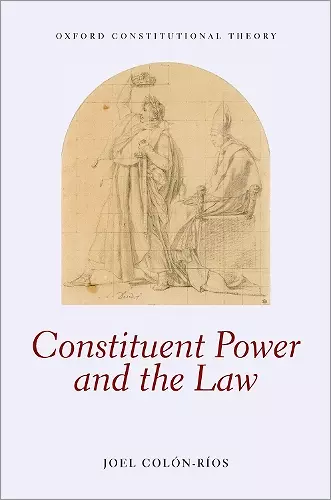Constituent Power and the Law
Format:Hardback
Publisher:Oxford University Press
Published:26th Mar '20
Currently unavailable, and unfortunately no date known when it will be back

Constituent power is the power to create new constitutions. Frequently exercised during political revolutions, it has been historically associated with extra-legality and violations of the established legal order. This book examines the relationship between constituent power and the law. It considers the place of constituent power in constitutional history, focusing on the legal and institutional implications that theorists, politicians, and judges have derived from it. Commentators and citizens have relied on the concept of constituent power to defend the idea that electors have the right to instruct representatives, to negate the doctrine of parliamentary sovereignty, and to argue that the creation of new constitutions must take place through extra-legislative processes, including primary assemblies open to all citizens. More recently, several Latin American constitutions explicitly incorporate the theory of constituent power and allow citizens, acting through popular initiative, to trigger constitution-making episodes that may result in the replacement of the entire constitutional order. Constitutional courts have also at times employed constituent power to justify their jurisdiction to invalidate constitutional amendments that alter the fundamental structure of the constitution and thus amount to a constitution-making exercise. Some governments have used it to defend the legality of attempts to transform the constitutional order through procedures not contemplated in the constitution's amendment rule, but considered participatory enough to be equivalent to 'the people in action', sometimes sanctioned by courts. Building on these findings, Constituent Power and the Law argues that constituent power, unlike sovereignty, should be understood as ultimately based on a legal mandate to produce a particular type of juridical content. In practice, this makes it possible for a constitution-making body to be understood as legally subject to popularly ratified substantive limits.
... Colón-Ríos's book is undoubtedly a major advance in scholarship on constituent power … * George Duke, Elisa Arcioni, Oxford Journal of Legal Studies *
Colón-Ríos has written the high-theory constitutional analysis for our populist moment: a historically informed, theoretically nuanced investigation into the fraught relation between sovereignty, constituent power, and (constitutional) law that underpins contemporary political conflicts ... Closing his book, Colón-Ríos suggests several possible avenues for future research ... Should anyone take up these proposals, one would hope they model their investigation on what Colón-Ríos has produced: a thorough treatment of the historical and legal record that clearly demarcates the emergent theoretical terrain, and rigorously argues for future development of its insights. * J. Reese Faust, University of Memphis, Contemporary Political Theory *
ISBN: 9780198785989
Dimensions: 236mm x 160mm x 27mm
Weight: 716g
352 pages